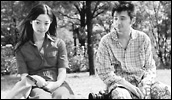Concent
- Year
- 2002
- Original title
- Konsento
- Japanese title
- コンセント
- Director
- Cast
- Running time
- 113 minutes
- Published
- 10 March 2003



by Michael Arnold
"Anata o kanjitai." Reading an invitation like this from Miwako Ichikawa, the kappa-faced fashion model who led the swooning schoolboys in All About Lily Chou-Chou (2000) and backed up the private dick in the Mike Hama TV series (2002), after a few stiff drinks I decided to accept. Despite my hopes however, this one didn't quite have the charge to shock me.
The offer to "feel us" ends the trailer for Shun Nakahara's 2002 feature, Concent. (Not conceRt, not conSent, but conCent with a C. "Konsento," meaning electrical outlet.) True to tradition, Nakahara bloomed from the Nikkatsu school of soft porno in the eighties, but today he's better known for a different kind of girly movie. His 1990 Argo Project picture The Cherry Orchard, a touching, somewhat overindulgent behind the curtains look at schoolgirls preparing for their yearly play, took Number One on the prestigious Kinema Jumpo Best Ten list the same year that Kurosawa's Dreams was stumped at fourth. Since then Nakahara has done some slick mainstream work, including 1991's Twelve Gentle Japanese (Juninin no Yasashii Nihonjin) and 1997's Lie Lie Lie, but I wonder if we should call this one a return to form.
Concent takes us into the life of Yuki Asakura (Ichikawa), a young freelance writer for investment magazines. At the tail end of an electric one-nighter with cameraman friend Jun (Jun Murakami), she gets an emergency call from mom and heads home. Yuki's brother Takayuki (Hoka Kinoshita), whose mental and social problems long tortured the family, was discovered rotting and smelly on his kitchen floor. His suicide is a shock to all - not to mention the audience, who get treated to vivid close-ups of sticky blood stains and soggy maggots - and Yuki's imagination starts to overload wondering what drove her brother to drip to such a miserable end.
Yuki begins to see her brother's ghost in hallucinations, smell phantom odors on her bed-buddy's breath, and remember her family's traumatic past. Female author Randy Taguchi's original novel Concent turned heads for bringing up issues like hikikomori (social withdrawal), mazakon (ultra-dependent mama's boys), women's sexuality and domestic violence, but in Nakahara's film adaptation these controversial topics are just the bait. While The Cherry Orchard dabbled in the safe cross-dressing fantasies of pubescent schoolgirls to draw its fragrant feminine world, ten years later Nakahara has uncovered the much randier cinematic glossary of psychoanalysis. Perky Ichikawa delves deep into her inner child and we find ourselves probing Nakahara's subconscious, where a power plug may be more than a plug and the concent itself is just what you would imagine.
Depressed by her brother's unexpected death, Yuki signs up for counseling sessions with her old college professor Dr. Kunisada (in a laughable performance by Masahiko Akuta, sporting a haircut that makes him look like an overgrown Kiss fan). The two agree to deal with her brother's death in a strictly "professional" manner - as we learn, she had a rather kinky relationship with the much older Doc during her school daze. Sorting out her memories, Yuki soon goes out to rent a video copy of the cult classic Mondo Cane, which she misremembers as including a scene of a boy plugged into a power outlet, and bumps into old college classmate Ritsuko (Miho Tsumiki, winner of the Mainichi Concours Best Supporting Actress award for playing the most believable, most resolutely butch of the schoolgirls in The Cherry Orchard). While describing her current anthropological research, Ritsuko offers us a clue; Yuki may be one of the new types of shaman that have appeared since the economic bubble popped. "You're the outlet," she later elaborates, and it appears more than a few of Yuki's friends want to connect for some sexual healing.
Still reeling from the off-screen assault at the love hotel, Jun proposes, but Yuki's too much of a modern gal for that shtick. "I'm loose with men!" Ritsuko wants to get charged too, but instead she hooks the unknowing friend up with her husband, Yamagishi (Mantaro Koichi). Shagging Yuki puts hubby very much at ease, but it just wasn't meant to be. Ritsuko later explains the setup in an outburst of the same-gender essentialism that grounds the role switching in Nakahara's other work: "I wanted to know what sex with you was like. But I'm not a lesbian so I couldn't do it directly." Uh-huh. When we finally reach the story's [cough-cough] climax, Yuki re-seduces psychoanalyst Kunisada. After enduring his analytical putdowns for the bulk of the film, she forces him to admit his own repressed feelings for his mother. She then rips open her dress, orders him to suckle on her breasts (whimpering, "mama, mama!") and finally, following all those aborted attempts during college, plugs him in and brings him to sexual overload. (He always said he was holding back, because "you were my student and I was a married man." Who did he think he was fooling?)
Loose or not, Yuki is mentally a bit more on top of things than, say, Shohei Imamura's Toriko in The Profound Desires of the Gods (1968) - another poster girl for the primitive sexual healing powers of "Okinawan" "shamanism" - and to be honest, with Shogo Ueno's clean Hi-Vision 24P digital cinematography, the first hour is rather interesting to watch. Unfortunately, just when our blood starts pumping the story goes limp and we're left with nothing but excuses. Like The Cherry Orchard, which hinted at same-sex love but stalled on the level of Takarazuka-esque fantasy, Concent makes us feel like Nakahara is forcing the lid shut when the water's already boiling. Yuki's sexual awakening is handicapped behind a safe mask of magical powers, like a Sailor Moon for the college crowd. This may not be that far from the good ol' days of Roman Pornos in dank Nikkatsu theaters after all.
Yuki passionately prods the doc: "Deeper! See as much as you want to see, then return." Too bad this one turned out to be so shallow. Next time I'll stick with The Cherry Orchard, which at least left some static electricity tingling between the characters.